- Home
- Q. Patrick
Death Goes to School
Death Goes to School Read online
Death Goes to School
Q. Patrick
I
ORCHID LADY
England in June. …
The day was windless, breathless. A few tiny clouds hung like apple blossoms above the playing-field of Craiglea Preparatory School. It was the middle of the year, the middle of the week, the middle of the term, the middle of the afternoon. Waves of heat quivered on the boundary line, dissolving the fringe of elms into a long green smudge and blurring the austere outlines of the school building, just visible through a gap in the trees. The whole scene was caught up in the afternoon stillness. Even the boys seemed loath to move. They lay on the ground at their parents’ feet, chewing stalks of grass and watching with drowsy eyes the cricket match which marked their half-term holiday—Parents versus Boys. There was no sound but the soft thud of bat on ball, the occasional cry of “over,” and the lazy drone of the spectators’ voices.
But to anyone more interested in making general observations than in watching a cricket match, a less tranquil element might have been apparent in this sunlit pastorale. The air was perhaps a little too sultry; in the sky the apple-blossom clouds were a shade too pink; and, almost out of sight, over the distant waters of the Bristol Channel, they were slowly moving together into dark, plum-colored battalions.
And like the heavens, the Craiglea boys were less ingenuous than they seemed. For despite their polite exterior, they were inwardly a prey to conflicting emotions. With the acute snobbishness of youth, they were tortured by fears lest their parents should somehow or other make themselves unduly conspicuous and thus disgrace them in the eyes of their schoolfellows.
Nor were the boys the only ones on the field to have problems of their own. In a distant corner, Stephen McFee, the new school porter, was rolling the pitches at the practice nets. For a young man of his splendid physique, this could not have been described as hard labor, yet he constantly paused and glanced across at the white-clad players in the center of the field. The deepening furrow on his brow showed that it was not merely the progress of the cricket match in which he was interested. His eyes seemed to focus with particular attention on the boy who was batting at the far end—Eric Bernard-Moss, one of the wealthy American twins who had arrived at Craiglea that term.
Nothing, however, impaired the serenity of Harvey Nettleton’s expression. The English master just down from Oxford, was lounging at square leg and paying but scant attention to his duties as umpire. His blue, Anglo-Saxon eyes kept wandering away in the direction of Sophonisba Dodd, the headmaster’s only daughter.
Nor, indeed, could any young man be blamed for neglecting the uninspired bowling of the Bishop and the text-book batting of Eric Bernard-Moss (major) to concentrate upon Sophonisba Dodd, who, with her delicately sun-tanned complexion and sea-gray eyes, looked like a lovely incarnation of this rare June day.
Meanwhile, the cricket match went serenely on. The players moved along their leisurely course towards victory or defeat, utterly unconscious of the subtle portents of tragedy which even now, like the coming storm, were charging the atmosphere with uneasy electricity. The parents had acquitted themselves well and, thanks to the vigorous batting of Sir Wilfrid Pemberly, the Chief Constable of the county, they had amassed 135 all out. Now the boys, with 92 for 8 wickets, were making a last desperate fling for victory. The sixty-odd boarders who were not playing had forgotten to worry about their parents. They were jumping up and down, banging one another on the back, and altogether acting as little boys should.
This schoolboy ebullience subsided a trifle at the sight of Mrs. Dodd, who was moving up and down the field in an attempt to include each group of parents in her hospitable attention. The headmaster’s wife, being the daughter of a baronet herself, was always able to appear just a little more gracious, just a shade more at her ease than even the haughtiest of her guests. This was an appreciable triumph since Craiglea was one of the most select institutions of its kind in England, and its clientele was culled from the sacrosanct pages of Debrett and the Tatler.
With her mass of snow-white hair and her aristocratic contempt for personal tidiness, Mrs. Dodd (like Queen Victoria, whom she greatly resembled) had achieved the difficult combination of motherliness and distinction—a major factor in the success of Craiglea.
Mrs. Dodd shot an all-embracing smile round the group of parents and hurried off in the direction of the school house to meet her husband.
The Reverend Samuel Dodd was walking at a leisurely pace, and at his side, like a graceful frigate guided by a fussy tugboat, strolled a tall, slender woman. She wore a long flowing dress of a delicate orchid shade and a large orchid hat. In her hand she held an almost impertinently tiny orchid parasol. Her black hair bunched in shining curls round her ears, and her full mouth drooped with a smile that was at once childlike and sophisticated.
Mr. Dodd’s small eyes, deep-set beneath his scholarly brows, were twinkling as he led this radiant creature up to his wife.
“This is—ah—Mrs. Bernard-Moss, my dear,” he began, presenting the lady. “She has come all the way from—ah—America to see the twins. They are her stepsons, you know. She had no idea it was Parents’ Day, and so our pleasure at seeing her is all the greater in that it is unexpected.”
“Delightful, delightful,” exclaimed Mrs. Dodd, holding out her hand and smiling graciously. “All the way from America! Then you must come and stay with us at the school. The Bishop of Saltmarsh will be there, and Sir Wilfrid Pemberly. Oh, yes, we have plenty of room.” Mrs. Dodd was performing feats of mental arithmetic with regard to her spare bedrooms. “No, of course, it won’t be any trouble.”
“Isn’t it all lovely?” Myra Bernard-Moss was murmuring in a soft contralto voice which surprised her hostess by lacking even the trace of a nasal twang. “I never dreamt that England could be so amazingly—English. Cricket, too! How cute!”
“And one of your boys is batting at the moment,” put in Mrs. Dodd, glancing towards the pitch. “I’m afraid I’m not sure whether it’s Moss major or minor. They’re so difficult to tell apart, aren’t they?” She gave a little laugh. “I suppose I must explain their names to you. We call Erio, Moss major, and Irving, Moss minor. It was quite a problem deciding which was to be what, but that’s the way we finally arranged it, since Eric is a wee bit bigger.”
Mrs. Bernard-Moss, too, had turned her amber eyes in the direction of the cricketers. “Which of those boys is my stepson?” she asked. “It sounds crazy, but I’ve never met them, you know. The Judge and I have only been married a short while and this is the first opportunity I’ve had to come over and see his sons.”
Mr. Dodd pointed Moss major out and then beckoned as he caught sight of McFee. The school porter had finished his work at the nets and was pushing a wheelbarrow full of garden tools along the boundary line.
Touching his cap, McFee approached: He was a tall man of about thirty with large bones and amazingly good teeth. His eyes were more shrewd and observant than one would have expected in a school porter.
“Oh, McFee, will you please find Moss minor and tell him his—ah—mother would like to see him?”
“Sure—certainly, sir.”
For a moment McFee did not move. His eyes were fixed upon Myra Bernard-Moss with an appraising, almost searching scrutiny. Then, touching his cap once more, he smiled and pushed the wheelbarrow away in the direction of the pavilion.
As Mr. and Mrs. Dodd led their latest guest towards the groups of parents, numerous glances were thrown in their direction and rested upon Mrs. Bernard-Moss a little longer than well-bred glances should. The English mothers felt suddenly self-conscious about their own dowdy clothes and looked a trifle furtively towards their husbands. Barely audible whispers floated down the lin
e of spectators.
Myra Bernard-Moss’s poise and composure gave the needed air of respectability to her youthful appearance, and, in consequence, the women began to thaw visibly. Even Mrs. Wood-house, the catty wife of the local doctor, was forced to admit that the astonishing American complexion owed its perfection to natural rather than artificial causes, and that Mrs. Bernard-Moss could not be a day over thirty. Lady Adela reshuffled her ideas about the orchid ensemble and wondered whether a modified version of it might not perhaps be suitable for her next visit to Ascot.
The boys, on the other hand, were not so easily won over. Appalled by the conspicuousness of Mrs. Bernard-Moss’s transatlantic toilette, they nudged one another and whispered:
“Just like those Moss twins to have such a swanky mater.”
But Mrs. Bernard-Moss seemed quite unaware of their disapproval as, ciceroned by Mrs. Dodd, she moved down the line.
“Oh, what a lovely girl!” she exclaimed, tilting her parasol at Sophonisba who was still lying back lazily in her orange deck-chair. “Mr. Dodd, you simply must introduce me.”
The headmaster hurried forward to present his daughter.
“Your daughter!” Mrs. Bernard-Moss turned impulsively to Sophonisba. “My dear, you’re the first real English girl I ever met, and you’re so exactly my idea of how they ought to look.”
Sophonisba was rather taken aback by this rapturous greeting. As she rapidly took in the details of Myra Bernard-Moss’s luxurious beauty—the fringed lashes, the dark hair which threw into relief the perfect porcelain of her skin—the girl was for the first time aware of her own hatlessness and her simple cotton frock. Her hair, she felt sure, was hopelessly wispy, and the tip-tilted nose, of which she was secretly proud, seemed suddenly to have dwindled into a commonplace, boyish snub. She found herself at a loss for words.
“Oh, you’re—you’re the first real American—”
She broke off lamely, cursing her luck that Harvey Nettleton, just relieved by Mr. Heath from his duties as umpire, should have chosen this of all moments to come up.
She turned away, trying to conceal her embarrassment behind vicious dabs from a large powder-puff. But she need not have worried for, as her father made the introductions, Harvey’s gaze had concentrated with a kind of admiring astonishment upon the American lady’s face.
Neither Sophonisba nor her father noticed this. Nor did they notice an almost imperceptible widening of Mrs. Bernard-Moss’s amber eyes. It was all over in a flash. By the time Sophonisba looked up, these two handsome young people were as composed as ever and Harvey Nettleton’s voice with its almost exaggerated Oxford accent was drawling:
“How d’you do, Mrs.—Bernard-Moss?”
“How d’you do, Mr.—er—? I’m afraid I didn’t catch the name.”
“Nettleton,” said the young man distinctly. “Harvey Nettleton. Shall you be long at Craiglea?”
“Oh, that depends.” Mrs. Bernard-Moss’s silvery laughter rang out, and, although her eyes were on Sophonisba, it was obvious that her words were directed towards the young man. “I’m here to make the acquaintance of my stepsons, you know. Maybe they won’t like me. If they don’t, I shall have to go back to Minnesota, though I’m afraid it will seem rather—unromantic after this lovely, lovely piece of England. Don’t you think so, Mr. Nettleton?”
“I regret to say I have never been to—er—Minnesotah. I have never even had the pleasure of visiting Americah.” Harvey Nettleton’s drawl seemed even more pronounced than usual. “But I can imagine it could be quite romantic.”
“Well, well, here’s your son,” broke in Mr. Dodd, as a small figure strolled towards them. “Mrs. Bernard-Moss, let me present Eric—I mean Irving. Here at Craiglea we eliminate hyphens, and to us he is known as Moss minor.”
With a tactful glance at his daughter, the headmaster hurried away. Sophonisba followed, accompanied by the English master, thus leaving Mrs. Bernard-Moss alone with her stepson.
To Sophonisba, who had taken the nearest vacant deck-chair, the interview between stepmother and son did not seem particularly successful. She could see Mrs. Bernard-Moss failing lamentably in her efforts to obtain some response from the boy. Irving showed no enthusiasm. He hung his head sulkily and tilted back and forth on his heels.
Sophonisba turned away to watch the cricket match. Sir Wilfrid Pemberly had just delivered a tricky ball which Rogers, who was approaching his fifty, cut with neat precision to second slips.
“Come on!” shouted Moss major from the far wicket, and sprang forward.
“No, no. Get back.”
Rogers hesitated, but Moss had started to run, and there was no alternative but to follow his lead. A suppressed groan rose from the spectators as the Bishop of Saltmarsh fielded the ball with unsuspected agility and returned it to the bowler rather than the wicketkeeper. The groan turned to a wail as Sir Wilfrid swept the bails from the wickets and barked a ferocious “Howsat?” at Mr. Heath.
“Out.”
The mathematics master raised a finger and Rogers started to walk back to the pavilion. Moss major had run the captain out on the very eve of the school’s victory and his own half-century. One hundred and eighteen and only one more wicket to fall. The match was as good as lost.
But there were more potent forces than Moss major to conspire against the school’s victory. Hardly had Rogers removed his pads when a sudden gust of warm wind rustled the maternal skirts. The plum-colored clouds that had hitherto been squatting inconspicuously over the sea, began to assume alarming proportions. A shadow sped across the grass, swallowing the sunlight. Then, like an ominous drum-tap, thunder sounded behind the school house.
A mild panic ensued on the Craiglea cricket-field. Holding their hats, the ladies sprang from deckchairs and fumbled for their belongings. Boys and men scurried to and fro. Even the players abandoned their posts, and, headed by Moss major, made a wild dash for the school. Mrs. Dodd trotted hither and thither giving warning and advice. Mr. Dodd shouted for McFee to take in the deckchairs and then forgot all about it. Sophonisba and Harvey Nettleton sprinted towards a short cut through the little copse that stretched before the school buildings. Even St. John Lucas reversed the role of Casabianca and deserted his post at the telegraph board, leaving his reverend father to a watery fate.
And all this time the rain was coming. When finally it split through the pall of clouds, the playing-field was almost deserted. The motley crowd of mothers, fathers, cricketers and boys had passed the elm trees and was well on the way to the house. Only three figures, left somehow behind, were hurrying along the boundary line—a tall woman with an orchid parasol, a stout elderly man and a little boy.
“This way,” shouted Mr. Dodd, beckoning encouragingly to Mrs. Bernard-Moss, who, grasping the reluctant hand of Irving, was making the best time that her long skirts would permit.
The rain sheeted down, hissing against the parched earth. It splashed against the tangled undergrowth as the sodden trio approached the little copse.
“I really must apologize for our climate,” Mr. Dodd was murmuring, wiping the water-drops from his nose. “It really is most unaccount—”
He broke off suddenly, ducking and throwing up an arm to shield his face.
“Look out!” he shouted.
From the bushes in front had come a sharp hiss like a snake’s, and, for the fragment of a second, he caught a glimpse of a missile hurtling towards the three of them with murderous speed. As he ducked, something whizzed within a few inches of his nose, and instantly the orchid parasol jerked downward. There was a sound of splitting silk, and Mrs. Bernard-Moss stumbled forward over the wet grass.
“Good heavens! Are you hurt?”
Mr. Dodd hurried to assist her.
“No, no. I’m all right.” The voice was feeble. “I think somebody must have thrown something at us. Where’s Irving?”
Mr. Dodd turned to see the small figure of Moss minor running back towards the cricket-field. Soon he returned, holding out a r
ound red object.
“It was a cricket-ball, sir,” he panted, pointing into the copse. “Thrown from in there, sir. Who could have. …?”
Bewildered, Mr. Dodd started through the thick tangle of brambles and wild roses.
“Who threw that ball?”
There was no reply. In a flash of lightning he could make out the indeterminate backs of boys and visitors streaming through the driving rain towards the school. He was about to run forward when a hand on his shoulder detained him.
“Stop, please.” Mrs. Bernard-Moss had recovered her composure. “There’s no real harm done. I suppose I might have been hurt, but I warded it off with this.”
She held up the once elegant parasol. It was nothing now but a few limp strands of silk on broken wires.
“I never in all my life—” gasped Mr. Dodd apoplectically. “Why, you might have been killed!”
“But I wasn’t, you see.” The smile was radiant. “Oh, please let’s forget about it. I’m sure it was just—a little accident.”
“Thank you, thank you for making so light of it. But there will be an investigation, of course. I never in all my life—You are sure you’re unhurt?”
“Perfectly. Just a little wet, that’s all.” Dropping the now useless parasol, Myra Bernard-Moss slipped a damp arm under Mr. Dodd’s and, preceded by Irving, the two of them hurried up the drive to the house.
With gathering force the thunder rolled, the lightning flashed, the rain drove over Craiglea. But now everyone was safely inside the school house. The landscape seemed forlorn and deserted. Nothing remained of the recent summer pageantry—nothing but a few forgotten deckchairs and an orchid parasol, lying broken and bespattered beneath the elm trees.
II
SHE CREEPS BY NIGHT
The formal part of Parents’ Day was over. As the final car swung down the drive, Mrs. Dodd gave a contented sigh and hurried back to her drawing-room to make herself agreeable to the guests who were staying over night.

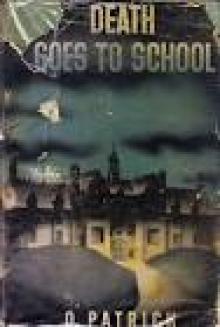 Death Goes to School
Death Goes to School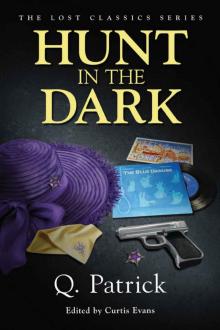 Hunt in the Dark
Hunt in the Dark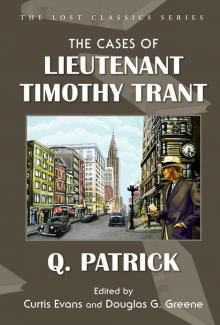 The Cases of Lieutenant Timothy Trant (Lost Classics)
The Cases of Lieutenant Timothy Trant (Lost Classics)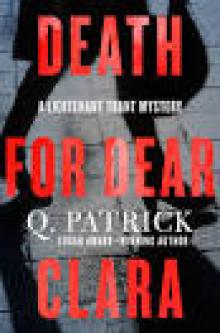 Death for Dear Clara
Death for Dear Clara S.S. Murder
S.S. Murder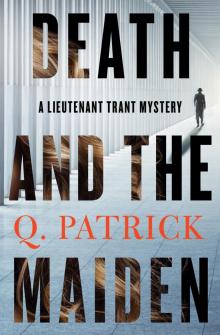 Death and the Maiden
Death and the Maiden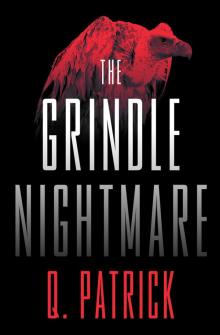 The Grindle Nightmare
The Grindle Nightmare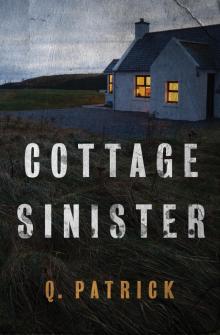 Cottage Sinister
Cottage Sinister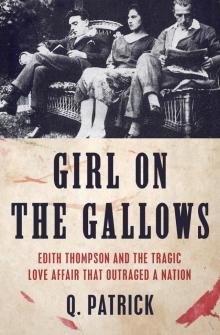 The Girl on the Gallows
The Girl on the Gallows